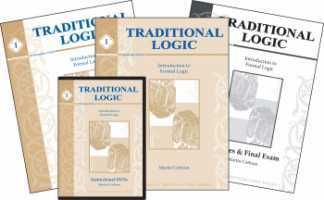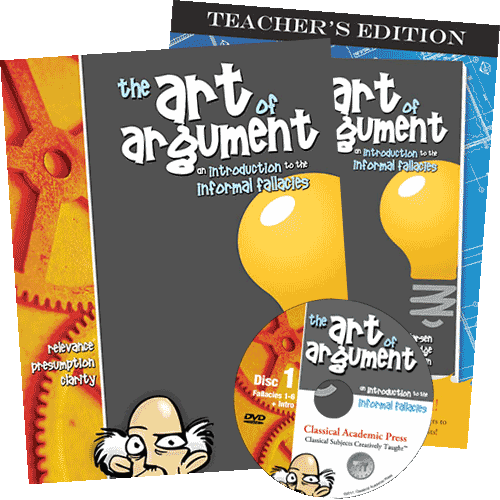
In March I learned that we had the opportunity to review Traditional Logic I Complete Set by Memoria Press.
I've used Memoria Press materials in the past and been very pleased with them. To top it off, though, my son was expressing a desire to study logic, so it was the perfect fit and the perfect time for us!
Initially, when the program arrived, my son was up to his eyeballs in a college course. Needing to begin the review, and wanting to study Logic myself, I started the program without him.
The Traditional Logic is for students in grades 7-12. The Traditional Logic I Complete Set, which we received, comes with instructional DVDs, the Workbook which the student uses, the book of Quizzes and Tests, and the Teacher Key (answers for the Workbook and Quizzes and Tests).
In initial perusal I found, in the Workbook, "A Note to the Teacher", so I started there. Next I watched the first instructional video (the "Introduction") on the first DVD, and then worked on the Workbook.
I like the DVDs. This might sound funny, but for my son (who is easily distracted and very critical of much educational media), it is watchable. The instructor is not a distraction. This probably sounds funny (or judgmental) to those of you who have never had a kid who gets distracted, but there are no crooked teeth, no glasses with light reflecting off of them. The teacher doesn't talk funny-sounding to us, like a southern twang accent. The instruction is therefore totally palatable for us (my student). Does that make sense?
When my son was finally free of his college course, I reminded him that we had the logic, and he dived in. I forgot to tell him to watch the DVD first, and as a result he initially found the course dry and boring. Fortunately I remembered after his first day in the material, so quick recovery!
The course is set up with the Introduction and 13 chapters (the Introduction is like one of the chapters). Each chapter is done over the course of a week. The student watches the lesson, reads the material, and each day answers a section of questions. After each week the student takes a quiz. There is only one test, at the end of the semester, so theoretically the book should be called Quizzes and Test instead of "Quizzes and Tests", but maybe that's just me... This is a one-semester course, for high school, so for a full credit you would do Traditional Logic II in the second semester. For younger students the course can be spread out over a full year, but it is still only 1/2 credit on a high school transcript.
I've enjoyed the work I've done so far in Traditional Logic, but I'm even more delighted that my son got the program started too! When he catches up to me I am hoping we can watch the videos together and discuss the material each week. I plan to encourage him to stick with it, because I really think he will like the material in weeks 7 and 8. I'd love for us to get to a place where we can look at each other and whisper, "Red herring!" and share an understanding as to where the logic broke down in the political speech we were watching or whatever. I'll always remember The Lion, The Witch and The Wardrobe (C.S. Lewis), and the professor saying, "What do they teach children in schools these days?..."
The study of logic is, in many ways, similar to the study of Math. They are related. Math is logical, and Logic and Math both build higher level thinking skills. My son is not happy to study Math. If at some point my son ends up disliking Logic, I'll have to chalk it up to the similarities between Logic and Math. For the time being, though, he is giving it a chance.
As a way to study logic, I give Traditional Logic 2-thumbs up! I do l like this program! And Memoria Press still scores 100% as a publisher whose materials I love!
Other members of the Review Crew also this and other products by Memoria Press. To see other product reviews, please click the button below.






